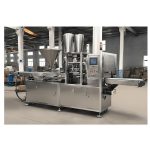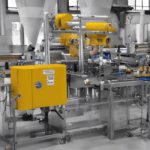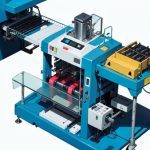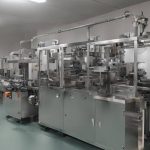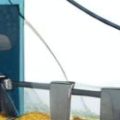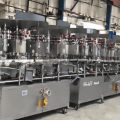
Understanding the Function of Automatic Filling Machines
Automatic filling machines are an integral part of modern manufacturing and packaging processes. They are designed to efficiently and accurately fill containers with a specified amount of product, which can range from liquids and powders to granules and pastes. The use of automatic filling machines is widespread across various industries, including food and beverage, pharmaceuticals, cosmetics, and chemicals. This article delves into the functions, types, and benefits of automatic filling machines, providing a comprehensive understanding of their role in industrial operations.
Key Functions of Automatic Filling Machines
The primary function of an automatic filling machine is to dispense a precise amount of product into containers, ensuring consistency and accuracy in the packaging process. This is crucial for maintaining product quality, reducing waste, and meeting regulatory standards. Here are some of the key functions of automatic filling machines:
1. **Precision and Accuracy**
Automatic filling machines are equipped with advanced sensors and control systems that ensure each container is filled with the exact amount of product. This precision is vital for industries where dosage and consistency are critical, such as pharmaceuticals and food production. By minimizing human error, these machines help maintain product integrity and compliance with industry standards.
2. **Speed and Efficiency**
One of the significant advantages of automatic filling machines is their ability to operate at high speeds, significantly increasing production rates. This efficiency is essential for meeting the demands of large-scale production and reducing operational costs. The automation of the filling process allows for continuous operation, minimizing downtime and maximizing throughput.
3. **Versatility**
Automatic filling machines are designed to handle a wide range of products and container types. They can be adjusted to accommodate different viscosities, volumes, and container shapes, making them suitable for diverse applications. This versatility allows manufacturers to use the same equipment for multiple products, enhancing flexibility and reducing the need for additional machinery.
4. **Hygiene and Safety**
In industries such as food and pharmaceuticals, maintaining hygiene and safety is paramount. Automatic filling machines are designed with materials and components that meet stringent sanitary standards, ensuring that products are not contaminated during the filling process. Additionally, automation reduces the need for manual handling, further minimizing the risk of contamination and ensuring a safer working environment.
Types of Automatic Filling Machines
There are several types of automatic filling machines, each designed to handle specific types of products and packaging requirements. Understanding the different types can help manufacturers choose the right equipment for their needs:
1. **Liquid Filling Machines**
Liquid filling machines are used to fill containers with liquids of varying viscosities, from water-thin beverages to thick syrups. They are commonly used in the food and beverage, pharmaceutical, and chemical industries. These machines can be further categorized into volumetric, gravity, and pump filling machines, each suited for different liquid types and container sizes.
2. **Powder Filling Machines**
Powder filling machines are designed to handle dry, free-flowing powders and granules. They are often used in the food, pharmaceutical, and chemical industries for products like spices, flour, and detergents. These machines typically use auger or cup filling mechanisms to ensure accurate and consistent filling.
3. **Paste Filling Machines**
Paste filling machines are used for products with a thicker consistency, such as creams, gels, and pastes. These machines are commonly found in the cosmetics, food, and pharmaceutical industries. They are designed to handle viscous products without compromising filling speed or accuracy.
4. **Net Weight Filling Machines**
Net weight filling machines are used to fill containers based on the weight of the product. They are ideal for products that require precise weight measurements, such as bulk commodities and high-value products. These machines are equipped with scales and sensors to ensure accurate weight-based filling.
Benefits of Using Automatic Filling Machines
The adoption of automatic filling machines offers numerous benefits to manufacturers, contributing to improved productivity, quality, and cost-effectiveness:
1. **Increased Production Capacity**
Automatic filling machines enable manufacturers to significantly increase their production capacity by operating at high speeds and with minimal downtime. This capability is crucial for meeting market demand and maintaining competitiveness in fast-paced industries.
2. **Reduced Labor Costs**
By automating the filling process, manufacturers can reduce their reliance on manual labor, leading to lower labor costs and fewer human errors. This reduction in manual intervention also allows employees to focus on other critical tasks, enhancing overall operational efficiency.
3. **Consistent Product Quality**
Automatic filling machines ensure consistent product quality by delivering precise and accurate filling every time. This consistency is essential for maintaining brand reputation and customer satisfaction, especially in industries where product uniformity is critical.
4. **Flexibility and Scalability**
Automatic filling machines offer flexibility in handling different product types and container sizes, allowing manufacturers to adapt to changing market demands. Additionally, these machines can be easily scaled up to accommodate increased production volumes, making them a valuable long-term investment.
Conclusion
Automatic filling machines play a crucial role in modern manufacturing and packaging processes, offering precision, efficiency, and versatility. By automating the filling process, these machines help manufacturers achieve higher production rates, consistent product quality, and reduced operational costs. As technology continues to advance, automatic filling machines will likely become even more sophisticated, further enhancing their capabilities and benefits for various industries. Whether in food and beverage, pharmaceuticals, cosmetics, or chemicals, automatic filling machines are indispensable tools for achieving efficient and reliable production outcomes.
